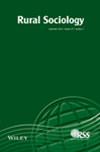Remittances and Livestock Management in Agropastoral Households in Rural Kyrgyzstan: Telecoupled Impacts of Globalization☆
IF 1.9
3区 社会学
Q2 SOCIOLOGY
引用次数: 0
Abstract
Agropastoralism and international labor migration are livelihood strategies that are interconnected as dominant ways of life across rural Kyrgyzstan. A prevalent rural livelihood strategy—agropastoralism—is closely tied to agrarian semi‐nomadic ways of life that link families and communities to the surrounding mountain environment. Another livelihood strategy—international labor migration—links or telecouples communities and income streams to transnational family structures, international labor markets, and distant economies. This article examines four hypothetical relationships between key elements of these two livelihood strategies. The relationship between remittances, pasture access, and livestock holdings is examined by analyzing 1,815 household surveys from southern rural Kyrgyzstan. We find remittances and livestock holdings have a significant positive relationship when a household is receiving a large amount of remittances, but not when the remittances received are modest. We also find that access to more distant, productive pastures is positively associated with the receipt of any amount of remittances. These findings demonstrate the ways in which migration and remittances can impact livestock management and agropastoral livelihoods at different levels of remittance reception.吉尔吉斯斯坦农村农牧家庭的汇款和牲畜管理:全球化的远程耦合影响
农牧业和国际劳动力迁移是吉尔吉斯斯坦农村地区相互关联的主要生活方式。一种普遍的农村生计战略--农牧业--与农耕半游牧的生活方式密切相关,这种生活方式将家庭和社区与周围的山区环境联系在一起。另一种生计策略--国际劳动力迁移--将社区和收入流与跨国家庭结构、国际劳动力市场和遥远的经济联系在一起,或将社区和收入流与跨国家庭结构、国际劳动力市场和遥远的经济联系在一起,或将社区和收入流与遥远的经济联系在一起。本文探讨了这两种生计策略的关键要素之间的四种假设关系。通过分析吉尔吉斯斯坦南部农村地区的 1,815 份家庭调查,研究了汇款、牧场使用权和牲畜存栏量之间的关系。我们发现,当一个家庭收到大量汇款时,汇款和牲畜存栏量之间存在显著的正相关关系,但当收到的汇款不多时,这种关系就不存在了。我们还发现,获得更远的高产牧场与收到任何数额的汇款都有正相关。这些研究结果表明,在不同的汇款接收水平下,移民和汇款会对牲畜管理和农牧业生计产生不同的影响。
本文章由计算机程序翻译,如有差异,请以英文原文为准。
求助全文
约1分钟内获得全文
求助全文
来源期刊

RURAL SOCIOLOGY
SOCIOLOGY-
CiteScore
4.60
自引率
13.00%
发文量
47
期刊介绍:
A forum for cutting-edge research, Rural Sociology explores sociological and interdisciplinary approaches to emerging social issues and new approaches to recurring social issues affecting rural people and places. The journal is particularly interested in advancing sociological theory and welcomes the use of a wide range of social science methodologies. Manuscripts that use a sociological perspective to address the effects of local and global systems on rural people and places, rural community revitalization, rural demographic changes, rural poverty, natural resource allocations, the environment, food and agricultural systems, and related topics from all regions of the world are welcome. Rural Sociology also accepts papers that significantly advance the measurement of key sociological concepts or provide well-documented critical analysis of one or more theories as these measures and analyses are related to rural sociology.
 求助内容:
求助内容: 应助结果提醒方式:
应助结果提醒方式:


